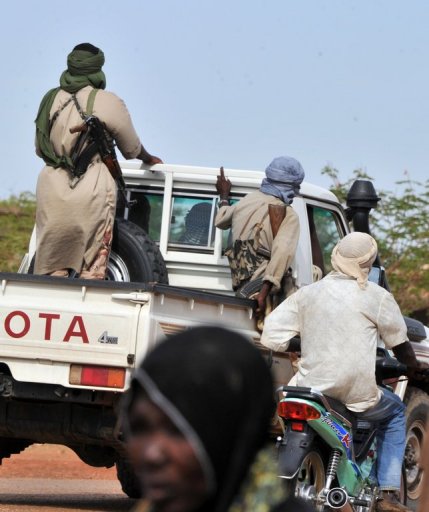Hundreds of jihadist fighters poured into Mali over the weekend to support the Islamists who have controlled the north for seven months, ahead of a threatened regional intervention to seize back power.
Residents of the cities of Timbuktu and Gao, Malian security officials and Islamist commanders all confirmed on Sunday that there had been a huge influx of foreign fighters over the past two days.
It comes as the Economic Community of West African States (ECOWAS), a regional bloc of 15 countries including Mali, prepares for military action in the north.
One resident of Timbuktu said “more than 150 Sudanese Islamists arrived in 48 hours”.
A source close to a local aid group also said that many Sudanese had arrived but added there were also fighters from other countries.
Timbuktu is one of the main cities in northern Mali, which Islamist groups have controlled since overpowering a secular Tuareg rebellion that seized the area in March.
The desert city is now under the control of Ansar Dine, a group led by a former Tuareg rebel leader, and Al-Qaeda in the Islamic Maghreb (AQIM).
In Gao, further east, a similar influx of foreign fighters was reported by residents.
Since Friday, Islamists have been arriving and reporting to the Islamic police of the Movement for Oneness and Jihad in West Africa (MUJAO), the AQIM offshoot that controls the city, said one resident.
He said he had seen around 10 pick-up trucks packed with armed fighters driving up to MUJAO’s main office in Gao.
The Islamist group itself confirmed it was receiving the support of foreigners as ECOWAS was finalising its plans for a military intervention.
Led by former colonial power France, the international community has urged Mali and its regional allies to speed up preparations for a military offensive.
ECOWAS has a 3,000-strong force ready to deploy but its funding and exact make-up remain unclear.
Malian troops could start training immediately for their operation, France’s Foreign Minister Laurent Fabius told French television on Sunday.
France has offered logistical support but no troops on the ground.
On March 22, army officers toppled the government in protest at what they said was its failure to equip them to counter a burgeoning rebellion by Tuareg separatists and Islamists in the north.
But that only accelerated the uprising. The ensuing power vacuum in the capital Bamako allowed the rebel forces to quickly seize the north, virtually unopposed.
The Islamist forces quickly sidelined their former Tuareg allies and now control a territory in the north which is larger than France. In the south, the officers who led the coup handed over to an interim administration, but retain considerable influence.
Ansar Dine and MUJAO have since implemented an extreme form of Islamic law in the north, amputating the hands and feet of thieves, stoning unwed couples and ordering women to wear full veils.
Western powers have expressed fears that Al-Qaeda and its affiliates could turn northern Mali into the same type of haven that Afghanistan was a decade ago.
Mali’s interim president Dioncounda Traore flew to Qatar on Sunday for a three-day visit. Some Malian media outlets have accused the oil-rich emirate of supporting the Islamists, but Doha has denied the allegations.

COMMENTS
Please let us know if you're having issues with commenting.